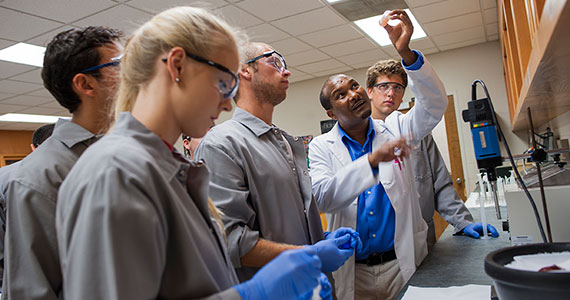Major grants and Picker Research Fellowship awards for 2014-15 are funding dozens of faculty research projects both on and off campus, with subjects ranging from Middle English punctuation to Russian climate science to the creation of an experimental documentary.
For biology professor Endga Hagos, his major grant funding will help continue research into the workings of the cancer-suppression gene Kruppel-like factor 4, a known tumor suppressor that plays a major role in the prevention of colon cancer.
“I’ve trained more than 30 students so far in my lab, and many of them have gone on to medical school,” Hagos said. “The ultimate goal of this research is eventually drug discovery.”
Educational studies professor Mark Stern, who conducts research on the political economy of public education in the United States, is using his Picker Fellowship to help support new qualitative research that examines how teachers in Philadelphia are educating each other, organizing, and working together to resist current educational reforms.
“The fellowship is providing me with generous financial support to live in Philadelphia in the fall during my junior faculty leave,” Stern said.
Economics professor Matthew Jaremski, who works to understand the financial systems in the United States before the establishment of the Federal Reserve System, said his Picker Fellowship will help to digitize historical bank directories at the New York State Archive and Library of Congress.
“The data will be capable of testing how clearinghouses affected bank composition and stability across the entire nation and across all the various types of banks,” Jaremski said. “In this way, the project will illustrate whether private institutions were capable of protecting the market in the absence of a central bank.”
Here is a full list of recipients:
Picker Research Fellowships
Heather Roller, history: “Contact Strategies: Independent Indians in the Brazilian Borderlands, 1700-1800”
Meg Worley, writing and rhetoric: “Besides the Point: Early Middle English Punctuation”
Wenhua Shi, art and art history: “Hundreds of Pictograms and Roars, Thunderings, Explosions, Hissing Roars, Bangs, Boom (The Futurist LoudSpeakers)”
Matthew Jaremski, economics: “Did Clearinghouses Reduce U.S. Bank Stability Before the Fed?”
Mark Stern, educational studies: “Teaching & Learning…Organizing and Agitating: Teachers and the Fight Against Neoliberal Education Policy”
April Sweeney, English and theater: “LONEtheater and Patagonia Prince/ss’ and the Underwater Forest”
Navine Murshid, political science: “Assam and the Foreigner Within: A Study on the Experience of Bengali Muslims in India”
Noah Dauber, political science: “Honor and Contentment: The Theory of the State in Early Modern England”
Major grant awards
Penny Lane, art and art history, Garrison Fellowship: “Nuts” (an experimental documentary film)
Randy Fuller, biology, Carter-Wallace Fellowship: “Whole-Ecosystem Restoration through Liming of Acidified Tributary Streams and a Watershed in the Honnedaga Lake Basin”
Kira Stevens, history, Hearst Fellowship: “Migration and identity: Swiss Colonies in 19th century Russia”
Barbara Hoopes, biology: “Identification of Variation in Novel Genes that Contribute to Body Size Determination in Small Dogs”
John Crespi, East Asian languages and literatures: “Sensation and Satire: A Magazine History of Chinese Manhua, 1918-1960”
Catherine Cardelus, biology: “Experimental Study of Nutrient Addition and Water Exclusion on Canopy Ecosystem Processes and Epiphyte Community Structure.”
Jessica Graybill, geography: “Russian climate science in a globalizing world: (de)constructing climate knowledge in an era of energy development on Sakhalin Island, Russia”
Priscilla Van Wynsberghe, biology: “Exploring new functions of circadian clock genes in C. elegans”
Engda Hagos, biology: “Role of Kruppel-like factor 4 as a tumor suppressor in mouse embryonic fibroblast cells”
Robert Turner, economics: “Using Contingent Choice Surveys for Environmental Evaluation: Two Applications”
Eddie Watkins, biology: “The role of polyploidy and hybridization in shaping ecological, physiological, and evolutionary processes in fern gametophytes.”
Yukari Hirata, East Asian languages and literatures: “Longitudinal development of second language speech: Will foreign accents be reduced through linguistic immersion?”

